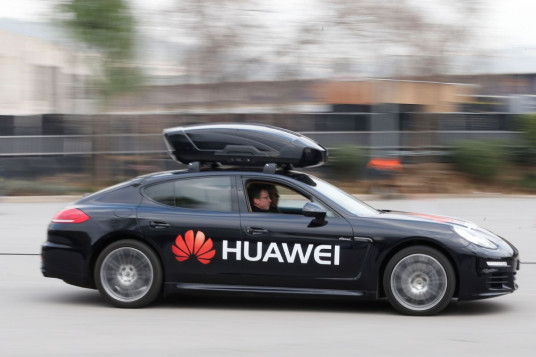Huawei drives ahead with smart car unit
 |
|
A Porsche Panamera car is steered by the Huawei Mate 10 Pro smartphone outside the Camp Nou stadium in Barcelona, Spain, during the Mobile World Congress in 2018. [Photo provided to China Daily] |
Chinese tech giant Huawei Technologies Co has recently established a smart car solutions business unit, as part of its larger goal of driving a connected and smart future.
"The automotive market is undergoing a profound information and communications technology-driven transformation," Huawei said in an internal document.
"Huawei will not make cars. Focusing on developing ICT technologies, Huawei will enable car manufacturers to build better smart vehicles. Having accumulated 30 years of experience in offering ICT technologies, Huawei will be an ICT component supplier for smart cars."
The newly formed business unit will offer end-to-end smart vehicle solutions including ICT components and solutions for car manufacturers, according to the document.
"As a leading provider of ICT products and solutions, Huawei needs to gear up its expansion into various industries, including the smart vehicle sector," said Raymond Wang, partner of global consultancy Roland Berger.
"Carmakers are accelerating the push for making a major foray into connected and intelligent cars. With advantages in areas like 5G technologies, in-vehicle computing platforms and cloud services, Huawei will be an enabler that helps carmakers to offer next-generation smart products."
The new move came as Huawei faces stiff headwinds from the US government's decision to put it on a blacklist.
The US administration accuses Huawei of posing risks to its national security. Huawei has repeatedly denied the accusations, claiming the charges were not supported by any factual evidence.
Against this backdrop, Huawei plans to sell its majority share in an undersea cable unit. The company will sell its 51 percent of Huawei Marine Networks, a global submarine network provider and a joint venture between Huawei and United Kingdom-based undersea cable company Global Marine Systems.
James Yan, research director at Counterpoint Technology Market Research, said considering the political headwinds, Huawei may need to shrink some businesses and focus its investment on key products and services offerings, such as the operating system, supply chain products, 5G and the smart vehicle business.
"The ban may hamper Huawei's short-term development, especially its overseas business. In the long run, Huawei may experience a low point in the near future. With a key focus in developing its operating system, Huawei will gain strong momentum in the domestic market. And it will also gear up its expansion in emerging markets globally," Yan said.
Yan noted that Huawei's new move in setting up the smart car business unit is an important aspect of Huawei's overall growth strategy.
"The smart vehicle will be a key portal that brings consumers intelligent experiences, in a move to better tap into the consumer internet of things sector. As China will soon issue licenses for the commercialization of 5G, the newly formed business unit will help Huawei to integrate its resources and become a key supplier of smart automobile electronics," Yan added.
Huawei's Business Group announced in March an all-scenario ecosystem strategy to bring consumers intelligent experiences, with the mobile phone as the main device, while other support portals include offerings such as connected vehicles, AI speakers, tablets, PCs and wearables.
